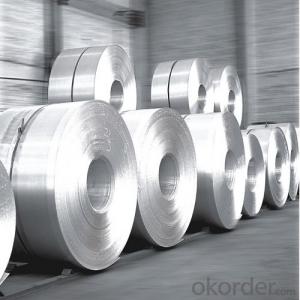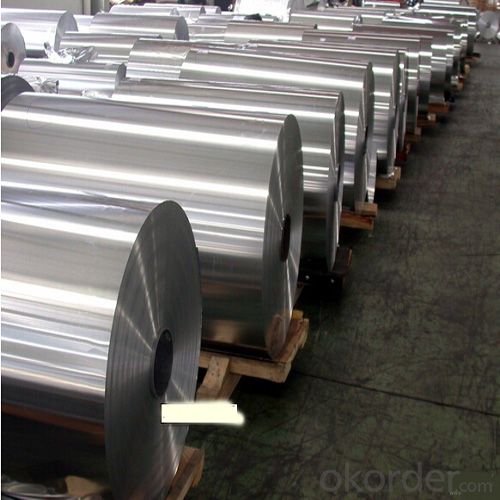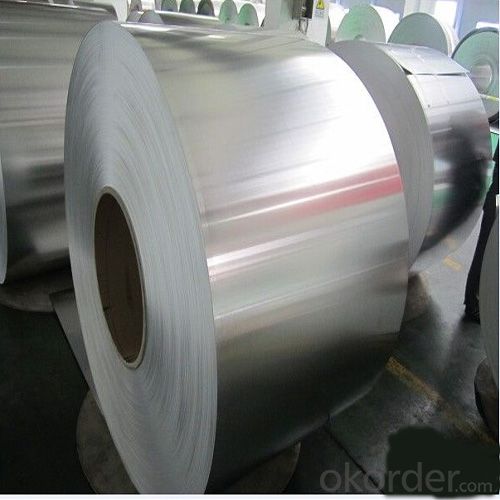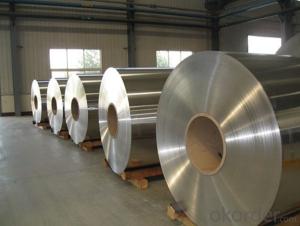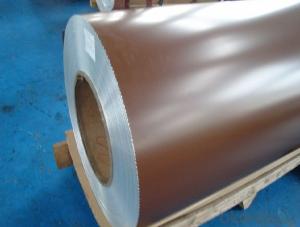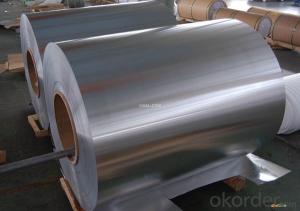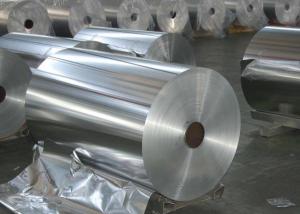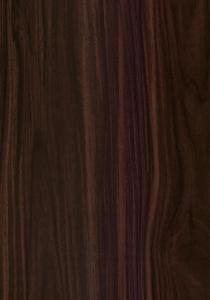Best Aluminum Coil 3003 for Truck Bodies at Competitive Prices
- Loading Port:
- Shanghai
- Payment Terms:
- TT OR LC
- Min Order Qty:
- 5 m.t
- Supply Capability:
- 10000 m.t/month
OKorder Service Pledge
OKorder Financial Service
You Might Also Like
Specification
1.Structure of Aluminum Coil 3003 for Truck Bodies Description:
Aluminum alloys 1xxx series, 2xxx series, 3xxx series, 5xxx series, 6xxx series and 8xxx series. They are available in various sizes with thicknesses from 0.1mm to 500mm, widths from 10mm to 3, 000mm andlengths below 12m. Aluminium coil 3003 Mainly used in signs, billboards, building exterior decoration, bus body, high-rise buildings and factories wall decoration, kitchen sink, lamp, fan leaves, with pieces of electronic, chemical equipment, sheet metal processing parts, deep drawing or spinning hollowware, welding parts, heat exchangers, bell surface and disk,plate, kitchenware, decorations, reflective devices, etc
2.Main Features of Aluminum Coil 3003 for Truck Bodies:
High temperature resistant nano color coated aluminum coil
Weathering resistant pre painted aluminum plate
Scrubbing resistant pre painted aluminum roll
3. Aluminum Coil 3003 for Truck Bodies Images:
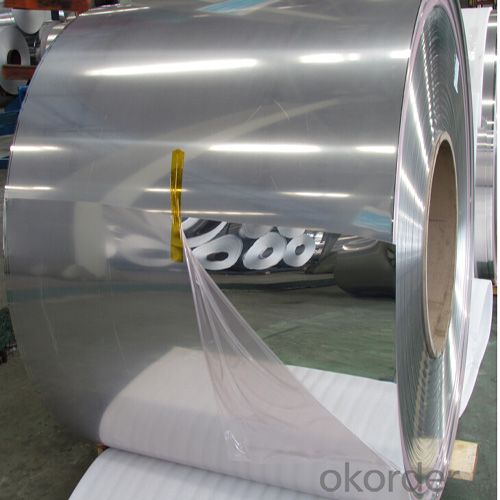
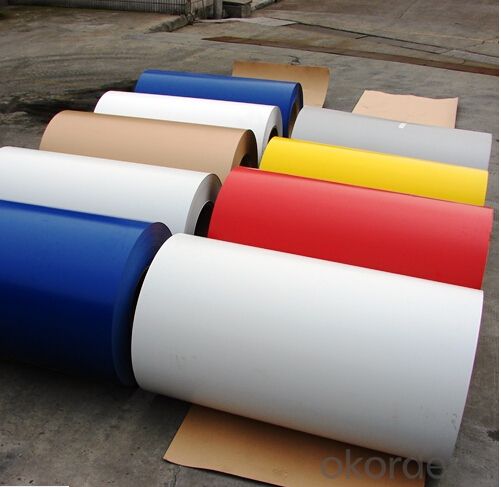
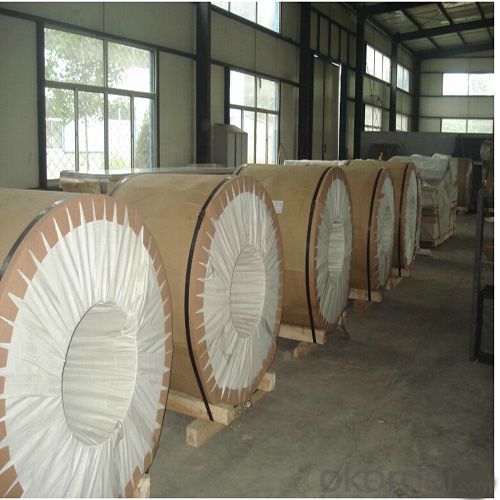
4. Aluminum Coil 3003 for Truck Bodies Specification:
| Aluminum Alloy: | AA1100,1050,3003,3004,3005,3105,5005,O-H112,ETC. |
| Temper: | H16,H18,H22,H24,H26,H28 |
| Aluminum Alloy Thickness: | 0.08mm~1.2mm(0.08,0.18,0.28,0.38,0.48,0.6,0.8,1 mm) |
| (0.1,0.15,0.25,0.35,0.45 mm) | |
| Coil Width: | 30~1520mm pre painted aluminum coil for Truck body |
| Core Diameter: | 150/405/505mm |
| Coil Weight: | 1~2.5tons each coil |
| Coating Type: | PE,PVDF,back coatting,ACRYLIC,feve |
| Surface Type: | Smooth,Embossed,mill finish,coated,brushed,etc. |
| Glossness: | 10-90%(EN ISO-2813:1994) |
| Coating Thickness: | PE:more than 18 +-1micron |
| PVDF:more than 25+-1micron | |
| Back Coating:8~10+-1micron |
5.FAQ
Q1.How long have you been in this product?
A1:More than 10 years.
Q2. What's the minium quantity(MOQ)?
A2. 5 Metric tons
Q3. How long is shipping time?
A3. 7 (ready-made products)-25 days(OEM)
Q4. How do you guarantee the quality?
A4. 1. Cooperating and Exchaning experience with sevral quoted aluminum companies
2. Japanese and Swiss production line and skilled works (regular training and testing)
3. more than 10 years production experience.
Q5. Do you have after sale service?
A5. Yes. Any quality problem occurs within one year, pls take photoes,we will be responsible.
- Q: Can aluminum coils be used in marine applications?
- Yes, aluminum coils can be used in marine applications. Aluminum is a popular choice for marine applications due to its excellent corrosion resistance, lightweight nature, and high strength-to-weight ratio. It is commonly used in the construction of boats, ships, and other marine structures. Aluminum coils are particularly useful in marine applications as they can be easily formed into various shapes and sizes, making them suitable for different parts and components in the marine industry. Additionally, aluminum coils can withstand harsh marine environments and are highly resistant to saltwater corrosion, which is a significant concern in marine applications. Overall, the use of aluminum coils in marine applications is a reliable and effective choice.
- Q: What are the common sizes and dimensions of aluminum coils?
- Aluminum coils come in various sizes and dimensions, which are determined by the particular industry and application they are used in. While there are common dimensions that are used across different industries, specific requirements may vary. In the building and construction industry, aluminum coils are typically available in widths ranging from 24 inches (609.6 mm) to 60 inches (1524 mm). The thickness of these coils can vary from 0.019 inches (0.48 mm) to 0.032 inches (0.81 mm), although thicker gauges may be available for specialized applications. For the transportation industry, particularly in the manufacturing of automobiles and aircraft, aluminum coils are generally wider and thicker. Widths can range from 48 inches (1219.2 mm) to 72 inches (1828.8 mm), and thicknesses can vary from 0.035 inches (0.89 mm) to 0.125 inches (3.18 mm). In the food and beverage industry, where aluminum is commonly used for packaging purposes, the dimensions of aluminum coils tend to be smaller. Widths can range from 12 inches (304.8 mm) to 24 inches (609.6 mm), and thicknesses are usually around 0.006 inches (0.15 mm) to 0.020 inches (0.51 mm). It is important to keep in mind that these dimensions are not exhaustive and may differ based on the manufacturer and specific requirements of the application. Therefore, it is always advisable to consult with suppliers or manufacturers to determine the most suitable sizes and dimensions for your specific needs.
- Q: This question asks about the potential health impacts of aluminum coils, which are commonly used in various industries and products.
- <p>Aluminum coils themselves are generally considered safe and do not directly affect health when used in their typical applications such as construction, electrical components, or food packaging. However, there is ongoing debate about the potential health risks of aluminum exposure, particularly when ingested. Some studies suggest a link between aluminum and neurological disorders like Alzheimer's disease, though this is not conclusively proven. It's important to note that aluminum is a common element found naturally in the environment, and the human body can naturally excrete small amounts. The use of aluminum coils in food packaging is regulated to ensure safety, and the risk of aluminum toxicity from these sources is considered low.</p>
- Q: How are aluminum coils used in the manufacturing of cookware?
- Due to their exceptional heat conductivity and lightweight nature, aluminum coils find extensive use in the production of cookware. Cookware manufacturers typically rely on aluminum coils as the primary material for constructing the bases and bodies of pots, pans, and other cooking utensils. To begin with, the process involves rolling out the aluminum coils and subsequently cutting them into various shapes and sizes to match the desired cookware product. Preferred over alternative materials such as stainless steel or cast iron, these coils excel in heat conduction, ensuring even distribution of heat across the cookware's surface for thorough and uniform cooking. Furthermore, the lightweight nature of aluminum coils enhances the manageability and maneuverability of the resulting cookware. This is particularly advantageous for professional chefs and home cooks, who frequently need to lift and move pots and pans while cooking. Moreover, due to the malleability of aluminum, it can be easily shaped and molded into diverse designs and styles for different cookware types like saucepans, frying pans, or baking trays. This versatility in cookware manufacturing allows for customization according to specific needs. Additionally, aluminum exhibits natural resistance to corrosion, making it a durable option for cookware. It remains unaffected by acidic or alkaline ingredients commonly used in cooking, ensuring the cookware's safety for food preparation and cooking. Lastly, aluminum coils can undergo treatments with non-stick coatings like Teflon, introducing the benefits of non-stick cookware. These coatings provide added convenience by facilitating easy food release and hassle-free cleaning. In conclusion, the utilization of aluminum coils in cookware manufacturing is essential due to their exceptional heat conductivity, lightweight construction, versatility in design, durability, and the option for non-stick coatings. These qualities make aluminum coils the ideal choice for producing high-quality cookware that delivers superior cooking performance and convenience in the kitchen.
- Q: Can aluminum coils be used for automotive body panels?
- Yes, aluminum coils can be used for automotive body panels. In fact, aluminum is a popular choice for car manufacturers due to its lightweight and corrosion-resistant properties, leading to improved fuel efficiency and longevity of the vehicle.
- Q: Are aluminum coils resistant to impact damage?
- Yes, aluminum coils are generally resistant to impact damage. Aluminum is a lightweight and durable material that can withstand minor impacts without getting damaged. However, excessive force or strong impacts may still cause damage to the coils.
- Q: Are aluminum coils suitable for heat exchangers?
- Yes, aluminum coils are suitable for heat exchangers. Aluminum is a highly efficient and effective material for heat transfer due to its high thermal conductivity. It can quickly transfer heat from one medium to another, making it ideal for heat exchangers where efficient heat transfer is required. Additionally, aluminum coils are lightweight, corrosion-resistant, and have excellent durability, making them a popular choice for various applications, including heat exchangers. The corrosion resistance of aluminum ensures that the coils can withstand harsh environments and prevent the formation of rust or corrosion, prolonging the lifespan of the heat exchanger. Moreover, aluminum coils are easily moldable and can be formed into various shapes, allowing for flexibility in design and construction of heat exchangers. This versatility makes them suitable for a wide range of applications, including HVAC systems, refrigeration units, and automotive cooling systems. In summary, aluminum coils are well-suited for heat exchangers due to their high thermal conductivity, lightweight nature, corrosion resistance, durability, and versatility. These properties make aluminum coils an excellent choice for efficient heat transfer in various industries.
- Q: What is the typical thickness of an aluminum coil?
- The typical thickness of an aluminum coil can vary depending on its intended use and application. However, in general, aluminum coils range in thickness from 0.006 inches (0.15 mm) to 0.25 inches (6.35 mm). Thinner aluminum coils are often used for lightweight applications such as packaging materials, while thicker coils are commonly used in construction, automotive, and aerospace industries where strength and durability are essential. It is important to note that the specific thickness requirements may vary based on the specific needs and specifications of the project or product being manufactured.
- Q: Is it appropriate to use a hammer to open or unroll an aluminum coil?
- <p>Using a hammer to open an aluminum coil is not recommended. Hammers are designed for striking and can easily damage the aluminum, causing dents or deformation. Instead, use a pry bar or a similar tool to gently unroll the coil without applying excessive force. This will help prevent damage to the aluminum and ensure it remains in good condition for further use.</p>
- Q: This question asks about potential health hazards linked to the use of aluminum coils in culinary settings.
- <p>There are some concerns about using aluminum cookware due to the potential for aluminum to leach into food, especially at high temperatures or in acidic environments. While the human body needs small amounts of aluminum, excessive intake can be harmful. It has been linked to neurological disorders, although the evidence is not conclusive. Most health organizations, including the FDA, consider aluminum cookware safe for general use. However, for those who are concerned, alternatives like stainless steel, cast iron, or non-stick coatings are available. It's always best to follow manufacturer's guidelines and avoid using aluminum cookware for acidic or highly acidic foods to minimize any potential risk.</p>
Send your message to us
Best Aluminum Coil 3003 for Truck Bodies at Competitive Prices
- Loading Port:
- Shanghai
- Payment Terms:
- TT OR LC
- Min Order Qty:
- 5 m.t
- Supply Capability:
- 10000 m.t/month
OKorder Service Pledge
OKorder Financial Service
Similar products
Hot products
Hot Searches
Related keywords
